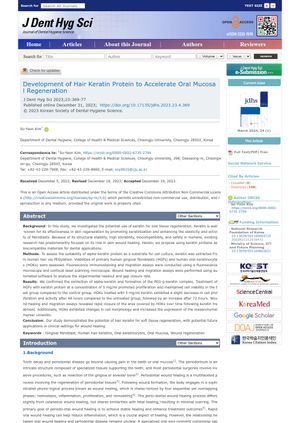TLDR Hair keratin protein might help heal mouth wounds faster.
The study "Development of Hair Keratin Protein to Accelerate Oral Mucosal Regeneration" involved the extraction and PEGylation of human hair keratin proteins, which were then tested on normal human oral keratinocytes (HOKs) and human gingival fibroblasts (HGFs). The keratin was found to be non-toxic to these cells. An in vitro migration assay was conducted to assess the impact of the keratin on cell movement, with the degree of movement assessed after 12 and 24 hours of incubation. The study also involved immunofluorescence staining to observe the cells' response to the keratin. The results were statistically analyzed, with the mean±standard error obtained from at least three independent experiments. The study suggests that hair keratin protein could potentially be used to accelerate oral mucosal regeneration, although further research is needed to confirm these findings.
 7 citations
,
November 2022 in “Communications biology”
7 citations
,
November 2022 in “Communications biology” Keratin injections can promote hair growth by affecting hair-forming cells and tissue development.
 3 citations
,
September 2022 in “The journal of investigative dermatology/Journal of investigative dermatology”
3 citations
,
September 2022 in “The journal of investigative dermatology/Journal of investigative dermatology” Keratin 75 is important for fast wound healing and works with SOX2 and the LINC complex to help skin cells move and repair damage.
42 citations
,
July 2021 in “Frontiers in Cell and Developmental Biology” Oral mucosa heals with minimal scarring, offering insights for scarless wound healing.
115 citations
,
August 2014 in “Jo'jig gonghag gwa jaesaeng uihag/Tissue engineering and regenerative medicine” Human hair keratin can be used in many medical applications.
143 citations
,
January 2012 in “Cell and Tissue Research” 47 citations
,
September 2011 in “Acta biomaterialia” Protein composition greatly affects the function of keratin biomaterials.
 May 2024 in “International Journal of Nanomedicine”
May 2024 in “International Journal of Nanomedicine” Biodegradable polymers can improve cannabinoid delivery but need more clinical trials.
 May 2025 in “Orphanet Journal of Rare Diseases”
May 2025 in “Orphanet Journal of Rare Diseases” TNF-α blockers and IL inhibitors improve symptoms in most patients with severe scalp condition, but more research is needed.
20 citations
,
January 2022 in “REVIEWS ON ADVANCED MATERIALS SCIENCE” Nanoparticles can make cosmetics more effective but have challenges like cost and safety.
 February 2023 in “Molecules”
February 2023 in “Molecules” Cactus extract from Notocactus ottonis may help promote hair growth.
 127 citations
,
June 2008 in “British Journal of Clinical Pharmacology”
127 citations
,
June 2008 in “British Journal of Clinical Pharmacology” Low doses of some substances can be beneficial, while high doses can be harmful or toxic.






